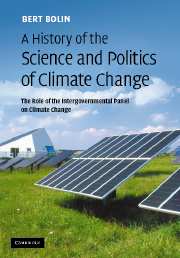 A History of the Science and Politics of Climate Change
A History of the Science and Politics of Climate Change Book contents
- Frontmatter
- Contents
- Foreword by Bo Kjellén
- Abbreviations
- Part I The early history of the climate change issue
- Part II The climate change issue becomes one of global concern
- 5 Setting the stage
- 6 The scientific basis for a climate convention
- 7 Serving the Intergovernmental Negotiating Committee
- 8 The IPCC second assessment report
- 9 In the aftermath of the IPCC second assessment
- 10 The Kyoto Protocol is agreed and a third assessment begun
- 11 A decade of hesitance and slow progress
- Part III Are we at a turning point in addressing climate change?
- Some concluding remarks
- Notes
- References
- Name index
- Subject index
9 - In the aftermath of the IPCC second assessment
Published online by Cambridge University Press: 03 May 2010
- Frontmatter
- Contents
- Foreword by Bo Kjellén
- Abbreviations
- Part I The early history of the climate change issue
- Part II The climate change issue becomes one of global concern
- 5 Setting the stage
- 6 The scientific basis for a climate convention
- 7 Serving the Intergovernmental Negotiating Committee
- 8 The IPCC second assessment report
- 9 In the aftermath of the IPCC second assessment
- 10 The Kyoto Protocol is agreed and a third assessment begun
- 11 A decade of hesitance and slow progress
- Part III Are we at a turning point in addressing climate change?
- Some concluding remarks
- Notes
- References
- Name index
- Subject index
Summary
The IPCC second assessment is severely criticised but it still plays an important role in preparing for the third conference of the parties to the Climate Convention scheduled for December, 1997, in Kyoto.
The post-Second Assessment Report discussions of an action programme to be agreed in Kyoto
The year 1995 ended with the completion of the SAR at the eleventh IPCC session in Rome. Earlier in the year the Climate Convention had formulated a mandate in Berlin for negotiations to be conducted during 1996 and 1997 in order to arrive at decisions on actions to be taken at the third conference of the parties at Kyoto. But the journey that awaited the IPCC during the next two years was not to be a smooth one. Even though the scientists that had been involved with the IPCC supported the conclusions that had been drawn, there was not complete unanimity in the scientific community about all that the IPCC had concluded, which of course was no surprise. Scientific progress is always based on challenging current knowledge. In addition stakeholders organised themselves in order to protect their conceived economic interests. The IPCC bulk reports exposed the uncertainties and disagreements as well as possible wherever they appeared, and the summaries for policy makers expressed these conclusions carefully in order not to give a false impression of certainty, where there was uncertainty. The paragraph that summarised our understanding of the degree of human interference with the climate system may be taken as an example. It was concluded, fully recognising the uncertainty in a caveat (see Section 8.2.1), that ‘… the balance of evidence suggests that there is a discernible human influence on global climate.’
- Type
- Chapter
- Information
- A History of the Science and Politics of Climate ChangeThe Role of the Intergovernmental Panel on Climate Change, pp. 125 - 146Publisher: Cambridge University PressPrint publication year: 2007
